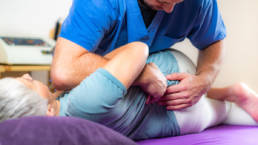How to Treat Whiplash
Whiplash is an injury caused by a sudden and vigorous movement of the neck. When this sudden force occurs and the neck is moved beyond its normal range of motion, there is a possibility that the neck muscles, tendons, ligaments, discs or nerves may be injured. Approximately 106 per 100,000 people in Australia suffer from whiplash injuries yearly (Nikles et al, 2017).
Causes:
- Motor vehicle accidents (most common)
- Sports collisions
- Slips or falls
- Blows to the head with a heavy object
- Physical abuse
The symptoms following whiplash may present immediately, several hours or days after the injury, and may vary depending on the grade of whiplash.
(Yadla et al, 2007)
| Grade | Classification |
| I | Neck pain, stiffness and tenderness only |
| II | Neck pain AND range of movement & point tenderness |
| III | Neck pain AND absent reflexes, weakness & changes in sensation |
| IV | Neck pain AND fracture or dislocation |
Symtoms:
- Neck pain and/or stiffness
- Headaches
- Dizziness
- Shoulder, upper arm or back pain
- Muscle spasm
- Altered sensation and/or weakness
- Visual disturbances or hearing difficulties
- Difficulty speaking or swallowing
- Difficulty concentrating and/or fatigue
(Yadla et al, 2007)
Diagnosis:
Diagnosis begins with a thorough history and hands-on clinical examination by an experienced health care practitioner. In some cases X-rays, MRI and/or CT scans may be required to confirm the diagnosis and grade of whiplash injury.
Treatment:
Patients receiving active therapy including manual therapy, mobilisations, postural & active exercises and advice have shown great improvements in pain intensity and range of motion. Other treatments for whiplash include soft cervical collars in the early stages, early physical therapy and coordination exercise therapy (Seferiadis et al, 2014) (Wiangkham et al, 2015).
Related Posts
Sunday & Public Holiday Chiropractic Appointments
29 October 2020
Pain and stiffness in our joints, muscles and bones can become debilitating if these symptoms go on for a time period. Sports injuries, work mishaps and slip and fall events may all result in serious discomfort. When a body is in enough pain, it can disrupt the person's daily routine.
0 Comments3 Minutes


